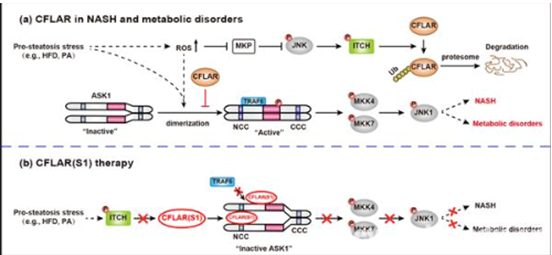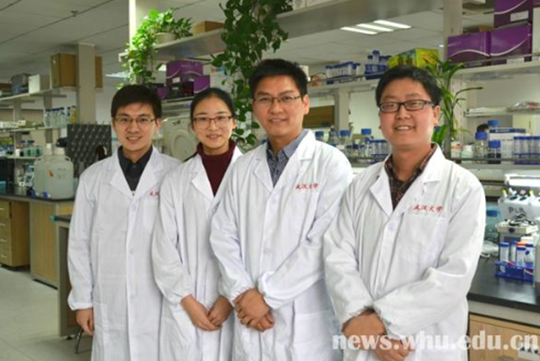On February 21st, Nature Medicine (IF=30.357) published the latest findings from Professor Li Hongliang’s research group. The research demonstrated for the first time that CASP8 and FADD-like apoptosis regulator (CFLAR), an important protein with innate immunity, is a key suppressor in the disease progression of nonalcoholic steatohepatitis (NASH). This finding is of great importance to the clinical treatment of NASH.
Titled “Targeting CASP8 and FADD-like apoptosis regulator ameliorates nonalcoholic steatohepatitis in mice and nonhuman primates”, this essay is the first paper WHU ever published independently in Nature Medicine. Its first authors are all WHU students: Wang Pixiao (Ph.D), Ji Yanxiao and Zhang Xiaojing (postdoctor). Professor Li Hongliang was the corresponding author. This project was funded by the National Science Fund for Distinguished Young Scholars, the National Natural Science Foundation of China, National Key Technology Support Program and National Key Research Program.
NASH is a progressive disease that is often accompanied by metabolic syndrome and poses a high risk of severe liver damage. However, no effective pharmacological treatment is currently available for this disease. After an eight-year research, the WHU research group led by Professor Li found that CFLAR is a key suppressor of steatohepatitis and its metabolic disorders. They provided mechanistic evidence that CFLAR directly targets the kinase MAP3K5 (also known as ASK1) and it interrupts its N-terminus-mediated dimerization, thereby blocking signaling involving ASK1 and the kinase MAPK8 (also known as JNK1). As a breakthrough of studies on metabolic liver disease, this result indicates that the development of CFLAR-peptide-mimicking drugs and the screening of small-molecular inhibitors that specifically block ASK1 dimerization are new and feasible approaches for NASH treatment.
Currently, the research area of Prof. Li’s group is focusing on defining the novel roles of innate immune network in cardiometabolic diseases. They are also working on the development of biotechnology for genome manipulation and animal model of human diseases.
As the dean of WHU’s School of Basic Medical Science, the director of WHU’s Animal Research Center, Collaborative Innovation Center of Model Animal, and the acting director of WHU’s Cardiovascular Research Institute, Prof. Li has published 126 papers in journals with 100+ impact factors, such as Nature Communications, Circulation, Circulation Research and Hepatology in the past 15 years. His essays were cited over 3000 times on SCI, for which he was awarded the Most Cited Chinese Researcher in both 2014 and 2015. After coming back to China in 2008, he founded the Model Animal Research Center of Hubei Province and Collaborative Innovation Center of Model Animal at WHU. In 2014, he was named as a Distinguished Young Scholar of the National Nature Science Foundation Committee of China. Furthermore, he was also the first applicant with over 120 domestic patents, 43 of which have been granted.

CFLAR interrupts the N-terminus-mediated dimerization of ASK1, thereby blocking signaling involving ASK1 and suppressing NASH and its complications.

Professor Li Hongliang (second from the right) with the first authors of the paper, Doctor Wang Pixiao (first from the left), Post-doctor Zhang Xiaojing (first from the right) and Ji Yanxiao (second from the left)
(Rewritten by Zhou Qianying, edited by Tang Yedan, Wu Siying, Edmund Wai Man Lai & Hu Sijia)
Source: http://news.whu.edu.cn/info/1002/47998.htm
http://www.nature.com/nm/journal/vaop/ncurrent/full/nm.4290.html
Renmin Hospital,School of Basic Medical Science


